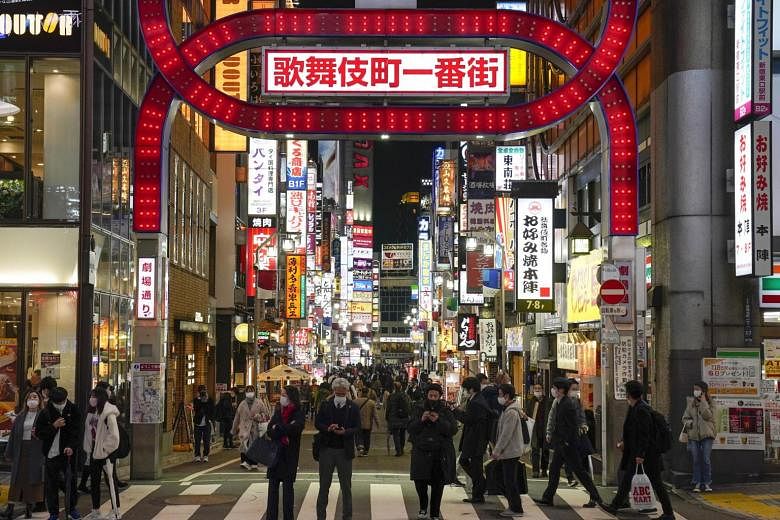TOKYO (BLOOMBERG) - As the coronavirus resurges in Japan, politicians and experts are growing more divided on the impact that a subsidy programme encouraging people to travel is having on the spread of Covid-19.
The popular "Go To Travel" campaign, which discounts trips to boost regions hit hardest by a lack of tourists, is one of the government's most prized projects for spurring the economy, and has been heavily backed by Prime Minister Yoshihide Suga.
But as the country tackles its largest surge in the virus yet, a debate has erupted over whether the programme is a main cause of the rise in infections. The risk is that the campaign could be doing more long-term harm than good in a country attempting to balance growing the economy and controlling the pandemic.
The "Go To Travel" campaign is just one of multiple subsidies promoted to kickstart the economy, with "Go To Eat" and "Go To Event" programmes offering restaurant and event discounts.
Critical commentary and opponents on social media have mocked the programmes as "Go To Hospital" or "Go To Heaven".
The campaign is also looking like it's crossing wires with local governments as they begin to implement fresh restrictions to stem the rising number of severe Covid-19 cases in Japan.
Tokyo's governor is urging residents to avoid unnecessary outings, and the government is raising the spectre of another state of emergency.
But national leaders are reluctant to scrap the stimulus that has been hailed for injecting trillions of yen into the economy. There have been only 197 infections among the more than 40 million people who have taken part in the Go To programme, Chief Cabinet Secretary Katsunobu Kato said Thursday (Nov 26), and the government hasn't received reports of hotel workers or others being infected by travellers, he said.
"There is no evidence that the travel programme is the main cause" of the surge, Mr Suga said at a parliamentary session on Wednesday, telling the opposition leader: "If you have a better idea, I'm open to hearing it."
Public concern
Mr Suga helped launch the programme during the summer surge amid great public concern. In an August interview, he said one reason for the subsidies is to keep hotels and inns afloat in order to reach the government's target of attracting 60 million foreign tourists by 2030.
The impact of the subsidies is significant. Nomura Research Institute economist Takahide Kiuchi said halting the programme for a year would shave 0.39 percentage point off GDP by eliminating some 2.17 trillion yen (S$27.9 billion) in consumer spending.
"Suga is passionate about the programme and doesn't want to cancel it," Mr Kiuchi said. "But if the government wants to help the tourism sector, it should give money to people in the sector directly."
The government has made some efforts to change the Go To programme amid rising infections. Last weekend, Mr Suga excluded from the campaign areas where the virus was spreading, but only for inbound travellers.
Discussions are under way to extend Go To through May 2021. About 51 per cent of those surveyed in an Asahi poll disagreed with such an extension, while 37 per cent approve. The poll, taken on Nov 14-15, showed that support for the programme was higher in Tokyo but lower in regions such as Hokkaido.
Mr Shigeru Omi, the head of the panel of experts advising the government, has called for a wider suspension to also exclude people in hot spots from going to other parts of Japan.
'Precautionary principles'
The campaign has also re-ignited a familiar butting of heads on the pandemic strategy between the national government and Tokyo authorities.
"It is obvious that positive diagnoses are increasing due to the movement of people," Tokyo Governor Yuriko Koike said earlier this week. Nonetheless, she refrained from asking that Tokyo be removed from the programme, arguing the national government should make a decision.
Other regional leaders have pushed back on efforts to rein in the campaign.
Mr Soichiro Takashima, the mayor of the southern city of Fukuoka, wrote that he didn't see a link. "We can't see any such correlation in Fukuoka."
But while the debate continues, Dr Hiroshi Nishiura, a mathematical modeller of infectious diseases at Kyoto University, said a caution-first approach may be appropriate.
"Of course it would be better to have a decision based on causal reasoning, but to show clear evidence that 'Go To Travel' caused a large infection after the fact would be too late," Dr Nishiura wrote. "During a phase of exponential growth, it may be necessary to work based off precautionary principles."











